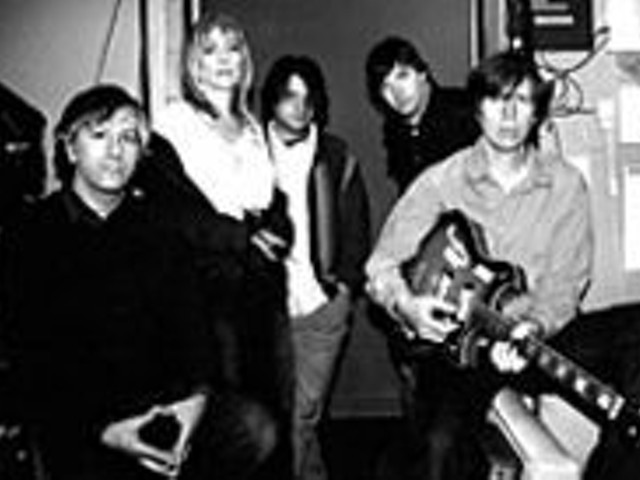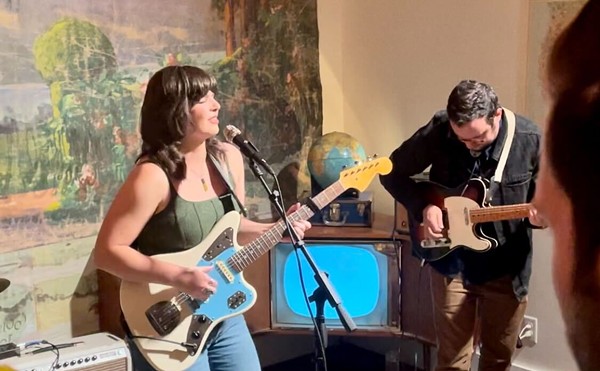McDermott first heard ragtime from his mother, Mary K. McDermott, who played novelty tunes such as Zez Confrey's "Kitten on the Keys" and "Dizzy Fingers," in addition to the works of Chopin and Beethoven, when he was a boy growing up in Kirkwood. He discovered Joplin in the early '70s, thanks to the KWMU-FM show Ragophile, hosted by pre-eminent St. Louis ragtime historian Trebor Tichenor, who's also recorded several CDs of piano rags. Ragophile also introduced McDermott to the music of Jelly Roll Morton, whose "Mamanita" is one of the twelve tunes on Danza. McDermott would soon be playing this music on the Goldenrod Showboat during its annual festival of ragtime and traditional jazz. It was where he first performed, at the age of 15, and he describes it as "a very formative experience."
Morton is one of three early New Orleans composers covered on Danza; Louis Moreau Gottschalk and Sidney Bechet are the others. But McDermott would be drawn physically to New Orleans by a very different, latter-day Crescent City genius of the keys: James Booker. "Around 1982, a New Orleans friend living in St. Louis hipped me to Booker," he remembers, "and I went completely ape over him." Booker died before McDermott moved to his city in 1984, but the scene down there offered him many other inspirations and opportunities, which, among other things, sent him even farther south.
"The Latin tinge is in a lot of music here," McDermott says of New Orleans. "I got hip to Brazilian music around 1986 and went to Brazil for the first time in 1989." Gigging in Brazil deepened his sense of the connections between choro and ragtime as he heard musicians down there playing both forms. A subsequent trip to Paraguay in 2001 with New Orleans reedman Tim Laughlin would prompt McDermott to arrange a waltz by Paraguayan master Agustín Barrios, "Valse #4," which appears on Danza as a solo piano performance. McDermott also takes a solo flight on "Atrapado," his own composition in the Argentine mode of the tango.
"I see myself as a jazzman who is exploring, as many jazzmen are these days, musics tangential to jazz," McDermott says. "A lot of jazzmen are bored by playing the standards. The difference is, I'm basically a trad player, and most trad players aren't adventurous; that's why they play trad, in part."
His adventurous approach toward tradition includes a playful affection for it. You feel this even in his straight-ahead performances on Danza, but it really rules his 1999 release Louisianthology. St. Louisans who have a penchant for tongue-in-cheek music -- those who've done time with the Brain Sandwich show on KDHX or who miss the goof-country band Rugburn -- should eat up this romp through New Orleans traditions, which includes a strut-piano number called the "Copacetic Boogie" and "When the Saints Go Marching In" arranged for synthesizer, tabla and congas. (The latter sounds as if the saints are marching into the sunset of a funky Bollywood film.)
One of the pleasures of delving into McDermott's records is that he writes his own liner notes, and they are models of fluency, wit and concision. He has a rare gift for stating without pretension precisely what he is doing with his music. No surprise, perhaps: He was a music critic for the Globe-Democrat before it folded in the '80s and has contributed to the RFT and to the Times-Picayune in New Orleans. His writing, composing and playing all breathe with the same smooth mixture of confidence and modesty. This guy knows what he is doing. He's so assured, so respectful of tradition and fellow musicians, that he has no need to call undue attention to himself.
This character trait (and, of course, the relative obscurity of jazz these days) explains why you may be hearing of Tom McDermott for the first time despite his world-class list of credits. To name a few: He's performed at Carnegie Hall (with the Dukes of Dixieland), been reviewed in the New York Times (in 1986), arranged a song for the Dirty Dozen Brass Band ("New Orleans Blues"), founded his own modern brass band (the New Orleans Nightcrawlers), gigged all over the world (New Zealand, Australia, Germany, Switzerland, France, Peru, Ecuador) and up and down our rivers on the Delta and American Queen riverboats, and recorded five CDs as a leader -- none of them shabby, none better than the newest, Danza.
On Danza, McDermott's hallmark confidence shows in his willingness to pair in a duet setting with a player such as Christopher, whose clarinet work in full flight could make any pianist sound like an accompanist. On Danza, McDermott is comfortable placing Christopher's clarinet in the spotlight, where it belongs, though listen to the interstices of the clarinet lines and you'll hear some inventive piano runs. Even when McDermott stretches out, as on the two songs he plays solo, his sometimes highly ornamented playing never comes at the expense of the tune's forward movement. You never feel an exercise of chops for chops' sake -- simply a resourceful musician trying to communicate all the possibilities of a song.
How might you experience this live? For now, you'd have to visit New Orleans (never a bad idea), though McDermott does make it home from time to time. His most recent gig in St. Louis was in November at Dressel's, which also provided his last steady gig in the '80s, when he was living in the Central West End. He also played live piano accompaniment to the Buster Keaton film Sherlock, Jr. at the 2001 St. Louis International Film Festival.
Until some local venue or festival organizes the showcase he deserves, the best way to hear Tom McDermott is to listen to his records, starting with Danza. If you've ever lost yourself in a rag, like to have your ears opened to new connections between musical idioms, have an appreciation for tasteful virtuosity on the piano or clarinet or simply would like to keep up with a local boy who made damn good, then Danza is a record that you need to hear.





